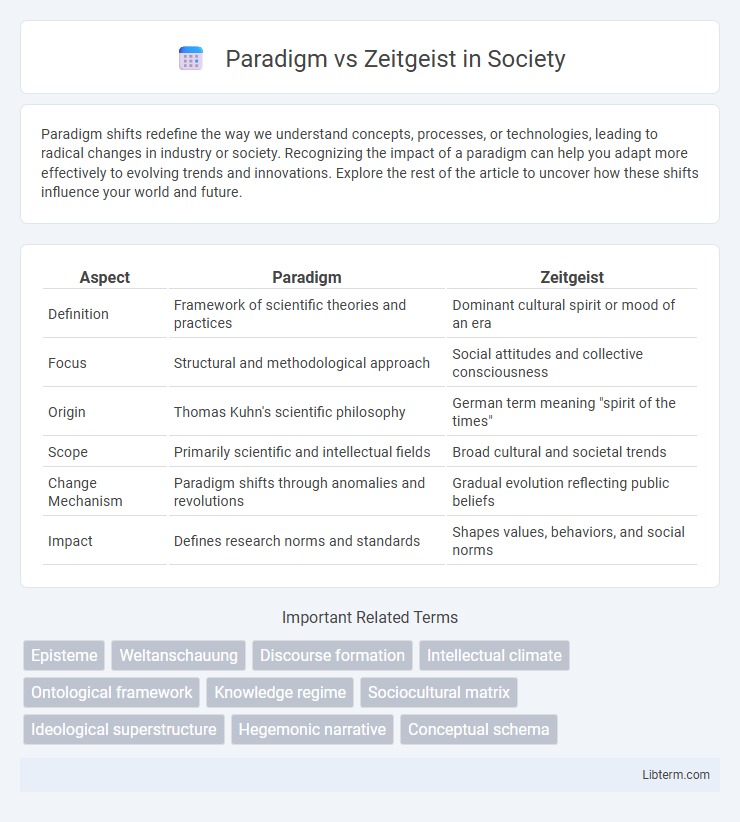Paradigm shifts redefine the way we understand concepts, processes, or technologies, leading to radical changes in industry or society. Recognizing the impact of a paradigm can help you adapt more effectively to evolving trends and innovations. Explore the rest of the article to uncover how these shifts influence your world and future.
Table of Comparison
| Aspect | Paradigm | Zeitgeist |
|---|---|---|
| Definition | Framework of scientific theories and practices | Dominant cultural spirit or mood of an era |
| Focus | Structural and methodological approach | Social attitudes and collective consciousness |
| Origin | Thomas Kuhn's scientific philosophy | German term meaning "spirit of the times" |
| Scope | Primarily scientific and intellectual fields | Broad cultural and societal trends |
| Change Mechanism | Paradigm shifts through anomalies and revolutions | Gradual evolution reflecting public beliefs |
| Impact | Defines research norms and standards | Shapes values, behaviors, and social norms |
Introduction to Paradigm and Zeitgeist
Paradigm refers to a prevailing framework of theories, methods, and standards that define scientific or intellectual practices within a specific period, shaping how knowledge and reality are understood. Zeitgeist denotes the dominant cultural, intellectual, and moral climate of an era, reflecting collective beliefs and social attitudes influencing art, politics, and philosophy. Both concepts capture the essence of their respective eras, with paradigms emphasizing structured knowledge systems and zeitgeist highlighting broader societal moods and trends.
Defining Paradigm: Meaning and Origins
A paradigm is a fundamental framework or set of beliefs that shapes scientific research and understanding, originating from Thomas Kuhn's analysis of scientific revolutions in his 1962 work "The Structure of Scientific Revolutions." This concept represents established norms and methodologies within a scientific community, guiding how data is interpreted and experiments are conducted. Paradigms contrast with zeitgeist, which refers to the broader cultural and intellectual climate influencing society beyond scientific discourse.
Understanding Zeitgeist: Concept and Evolution
Zeitgeist represents the dominant cultural, intellectual, and political climate of a specific era, reflecting collective attitudes and societal values. Its evolution is shaped by technological advancements, social movements, and historical events that redefine public consciousness over time. Understanding Zeitgeist involves analyzing these dynamic forces to grasp how they influence collective behavior and societal trends.
Key Differences Between Paradigm and Zeitgeist
Paradigm refers to a set of scientific or intellectual frameworks guiding research and understanding within a specific discipline, shaping methodologies and interpretations. Zeitgeist, on the other hand, denotes the prevailing cultural, social, or intellectual climate of a particular era, influencing broader societal attitudes and behaviors. Key differences include paradigms being structured and discipline-specific models, whereas zeitgeist encompasses a general spirit or mood affecting society as a whole during a certain period.
Historical Examples of Paradigm Shifts
Historical examples of paradigm shifts include the Copernican Revolution, which replaced the geocentric model with a heliocentric understanding of the solar system, fundamentally altering scientific thought. The Industrial Revolution transformed economic and social structures by introducing mechanized production methods and fostering urbanization. The digital revolution in the late 20th century shifted communication, information processing, and business models toward computer technology and the internet, exemplifying paradigm shifts that redefine knowledge and societal frameworks.
Zeitgeist in Culture and Society
Zeitgeist represents the collective consciousness and prevailing attitudes that define a particular era, shaping cultural norms, social movements, and public opinion. In culture and society, zeitgeist influences art, literature, fashion, and political ideologies, reflecting the underlying values and issues of the time. Understanding zeitgeist provides insight into societal shifts, helping to contextualize historical events and predict future trends.
The Role of Paradigms in Scientific Progress
Paradigms function as foundational frameworks that guide scientific research by establishing accepted methods, theories, and standards within a discipline. Scientific progress occurs through paradigm shifts, where anomalies in current paradigms lead to revolutionary changes and the adoption of new frameworks better suited to explain emerging data. These shifts reflect the dynamic nature of knowledge, driving innovation beyond prevailing Zeitgeist thoughts and cultural influences.
How Zeitgeist Shapes Public Opinion
Zeitgeist influences public opinion by reflecting the dominant cultural, social, and intellectual climate of a specific era, shaping how individuals perceive and interpret events. Media, art, and political discourse embody the Zeitgeist, reinforcing collective values and norms while guiding societal attitudes on key issues. This cultural momentum frames public consensus, often paving the way for paradigm shifts when emerging ideas challenge the established Zeitgeist.
Interrelation Between Paradigm and Zeitgeist
The interrelation between paradigm and zeitgeist reveals how dominant scientific frameworks (paradigms) both shape and are shaped by the prevailing cultural, intellectual, and social climate (zeitgeist). Paradigms emerge within the context of a zeitgeist, reflecting contemporary values and knowledge, while shifts in zeitgeist often precipitate paradigm changes by fostering new ways of thinking and challenging established norms. Understanding this dynamic interplay is crucial for analyzing how knowledge evolves and societies transition through scientific revolutions.
Conclusion: Impact on Modern Thought
Paradigm shifts and the Zeitgeist both shape modern thought by influencing how societies perceive knowledge and innovation. Paradigms provide structured frameworks that guide scientific progress, while the Zeitgeist reflects the broader cultural and intellectual climate driving collective beliefs. Understanding their interplay offers valuable insight into the evolution of ideas and the dynamic nature of contemporary intellectual landscapes.
Paradigm Infographic

 libterm.com
libterm.com